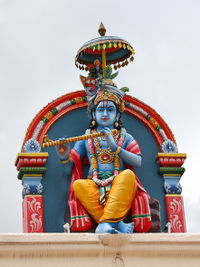Krishna

He tried to break all the concepts. The first concept He broke was that you have to be like an ascetic in looks. He broke this concept. He lived like the king. In His childhood, He used to go and play with the cows and there He would use a peacock’s feather to decorate Himself. And He would listen to the beautiful music of the River Yamuna and reproduce it. He was leela. He was the one who created all kinds of mirth.... Mirth is something where you feel tickled. So He tried to create mirth, never seriousness. But He was not frivolous. He was Yogeshwara. He was not frivolous, so this difference between frivolity and mirth is to be understood only through Him because He is also discretion. Mirth is joy-giving. Frivolity is destructive.... Life is for us to enjoy, nothing else. But because we are not free people, we cannot enjoy. There is no bondage of any evil thought which keeps you down. It is so subtle, but penetrating into everything that is gross. That is Shri Krishna’s beautiful flute which creates a picture of the nature. The description, the whole thing becomes silent like a picture. (23 August 1986)
Wikipedia
Krishna is a God, worshiped across many traditions of religion in a variety of different perspectives. Krishna is recognized as the complete and or as the Supreme God in his own right. Krishna is one of the most widely revered and popular of all Hindu deities.
Krishna is often described and portrayed as an infant eating butter, a young boy playing a flute as in the Bhagavata Purana, a young man along with Radha or as an elder giving direction and guidance as in the Bhagavad Gita. The stories of Krishna appear across a broad spectrum of Hindu philosophical and theological traditions. They portray him in various perspectives: a god-child, a prankster, a divine hero, and the Supreme Being. The principal scriptures discussing Krishna's story are the Mahabharata, the Harivamsa, the Bhagavata Purana, and the Vishnu Purana. (more)